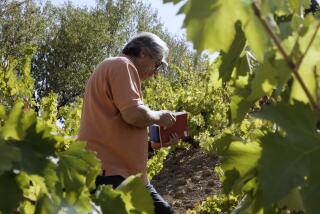Wine Talk in Old Baghdad
- Share via
Muslims are forbidden to drink alcohol. Wine is absolutely prohibited in Saudi Arabia, for instance. But throughout the Middle Ages, Christians and Jews continued to make wine in Muslim countries. They even ran bars that stayed open all night--and since people don’t always do what they’re supposed to, some Muslims patronized them.
A 10th century Baghdad writer named Badi’ al-Zaman al-Hamadhani wrote a series of stories called maqa^ma^t with an amusing rogue of a narrator named Isa ibn Hisham. In one of them, Isa and his disreputable friends went out for a night of drinking:
“When the day was croaking its last, we looked, and behold: the banners of the wine shops like stars in the jet-black night. We arrived at the shop with the most imposing door and the stoutest guard dogs, and stretched forth our coins and made our recklessness at home.”
There they met a flirtatious barmaid who praised her bar’s oldest wine in conventional terms, comparing it to the sweetness of her kisses and the rosy hue of her cheeks. And then she launched into the most extravagant exercise in wine connoisseurship--or maybe just wine hype--in medieval literature:
“Bidding farewell to age after age, a secret in the pocket of pleasure, it inherits bounties, the days and nights taking from it until there remain only fragrance and sunbeams and the fire that stirs the blood, and the aromatic herbs of the soul. It is like incandescence in the veins and a cold wind in the throat; a lantern of thought and an antidote to the poison of time.”
And in Arabic, the whole thing rhymes.
More to Read
Sign up for The Wild
We’ll help you find the best places to hike, bike and run, as well as the perfect silent spots for meditation and yoga.
You may occasionally receive promotional content from the Los Angeles Times.






